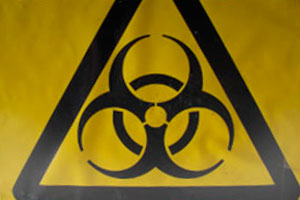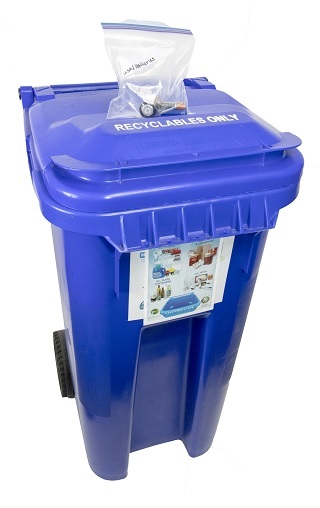
Hazardous Waste Warning
Wastes in this section are dangerous to you and the environment. Handle them carefully and dispose of them properly. Legally, households may not transport more than 15 gallons of wet or 125 pounds of dry hazardous materials. Read about the regulation.
Click below to check out our latest video:
Recycle Your Batteries at Curbside!
For those living in the unincorporated area of the County or in the cities of Buellton, Goleta, Santa Barbara, and Solvang, you now have a new option for recycling your batteries. Simply follow the steps below:
- Place the batteries in a zip-top plastic bag
- Put the bag on top of (not inside) your recycling container on your normally scheduled recycling collection day
- For rechargeable batteries and 9-volts (the rectangle kind that has both poles on one side), please tape the ends of each battery with clear tape so that the battery poles are not exposed (you can skip this step with single-use batteries)

For more information, check out our Frequently Asked Questions or contact your trash/recycling hauler.
Non-Rechargeable Batteries
Non-rechargeable or single-use batteries power many household items -- from flashlights to smoke alarms to remote controls and watches. You may recognize some non-rechargeables as AAA, AA, or 9-volt. Common types include alkaline, silver oxide, and lithium.
They seem pretty harmless, right?
If used and disposed of properly, yes, they're quite safe. Non-rechargeable batteries do contain corrosive chemicals that can be harmful to you and pets. Avoid leaving used batteries out in the open. Store them in a small bucket until you're ready to bring them to one of the collection sites below.
Consider the switch to rechargeables
Rechargeable batteries are a great alternative to the single-use variety. Because they can be continuously re-energized, rechargeables can last for years. The result: less waste, less money, and fewer trips to the store (and hazardous waste collection center!).
Where to go
-
All of Santa Barbara County (1)
- Safety Kleen — 5310 Overpass Road
-
Carpinteria Area (5)
- Albertsons — 1018 Casitas Pass Road
- Carpinteria Valley Lumber Company — 915 El m Avenue
- City of Carpinteria ABOP Center — 5775 Carpinteria Ave
- CVS Pharmacy — 1036 Casitas Pass Road
- Rite Aid — 801 Linden Avenue
-
Santa Barbara Area (11)
- *Community Hazardous Waste Collection Center — University of California, Environmental Health and Safety Building, Building 565, Mesa Road
- CVS Pharmacy — 1282 Coast Village Road
- CVS Pharmacy — 1835 Cliff Drive
- CVS Pharmacy — 222 West Carrilllo Street
- MarBorg Industries — 119 North Quarantina Street
- MarBorg Industries’ Recycling /ABOP Center — 132 Nopalitos Way
- Rite Aid — 1976 Cliff Drive
- Rite Aid — 825 State Street
- Rite Aid — 35 South Milpas Street
- San Andres Hardware — 635 West Micheltorena Street
- Santa Barbara Home Improvement Center — 415 East Gutierrez Street
-
Goleta & UCSB Area (5)
- *Community Hazardous Waste Collection Center — University of California, Environmental Health and Safety Building, Building 565, Mesa Road
- CVS Pharmacy — 189 Turnpike Road
- MarBorg Industries Recycling/ABOP Center — 20 David Love Place
- Rite Aid — 199 North Fairview Avenue
- Walgreens — 5900 Calle Real
-
Santa Ynez Valley (4)
- CVS Pharmacy — 218 East Highway 246
- Harrison Hardware — 1051 Edison Street
- Rite Aid — 616 Alamo Pintado Road
- Waste Management — 97 Commerce Drive
-
Lompoc Valley & VAFB (15)
- AL&S, Incorporated — 101 South H Street
- Anderson Recreation Center — 125 W Walnut Ave
- City of Lompoc Fire Station No. 1 — 115 South "G" St
- City of Lompoc Fire Station No. 2 — 1100 North "D" St
- City of Lompoc Household Hazardous Waste Collection Facility — 1585 N. "V" St
- City of Lompoc Landfill (Scalehouse) — Avalon Rd (south end)
- CVS Pharmacy — 1317 North "H" Street
- LampRecycling.com — 2200 Oden Avenue, #100
- Lompoc City Hall Lobby — 100 Civic Center Plaza
- Lompoc Public Library — 501 East North Avenue
- Lompoc Public Library – Vandenberg Village Branch — 3755 Constellation Road
- Vandenberg Air Force Base Commissary — Building 14300, Wyoming Avenue
- Vandenberg Air Force Base Exchange — Building 10400 Community Loop
- Walgreens — 937 North "H" Street
- Walmart — 701 West Central Avenue
-
Santa Maria Valley (12)
- City of Santa Maria Household Hazardous Waste Facility — 2065 East Main Street
- CVS Pharmacy — 1830 North Broadway
- CVS Pharmacy — 733 East Main Street
- CVS Pharmacy — 2116 South Broadway
- CVS Pharmacy — 4852 South Bradley Road
- Oak Knolls Hardware — 1155 East Clark Avenue
- Rite Aid — 345 Town Center West
- Rite Aid — 2405 South Broadway
- Walgreens — 707 North Broadway
- Walgreens — 2399 South Broadway
- Walmart — 2220 South Bradley Road
- Waste Management — 1850 West Betteravia Road
-
Outside Santa Barbara County (13)
- Asbury Environmental Services — 2100 North Alameda Street
- BGI — 527 North Rice Avenue
- C.J. Seto Support Services, LLC — 2300 Knoll Dr, Unit G
- Clean Harbors, Inc. — 880 W Verdulera St
- Earth911.com – Information Only — 3481 Plano Parkway
- Eco Lights Northwest Recycling Progam — 2200 6th Avenue South
- Industrial Waste Utilization — 5601 State Street
- LampRecycling.com — 2200 Ogden Avenue, #100
- Panasonic —
- Sharp —
- Stericycle, Incorporated —
- The Big Green Box — 125 East Commercial Street, Suite A
- Waste Management Incorporated, Think Green from Home —
Related Materials
- Green Franchises
- Product Stewardship
- Santa Ynez Valley Collection Event
- Recycling Resource Guide
- Automotive Batteries
- Smoke Detectors
- Portable Electronics Recycling
- Rechargeable Batteries
- Non-Rechargeable Batteries
- Batteries Explained
- Reduce Electronic Waste
- Portable Electronics Reuse
Related Articles
-
April 7th Hazardous Waste Collection Event
March 03, 2019 by Leslie Robinson - Hazardous Waste Recycling/Disposal -
Keep Your Waste in Check This Holiday Season
December 21, 2018 by Leslie Robinson - Reduce & Reuse -
“Less Is More” Guide Hot Off the Press
January 18, 2023 by Kaitlyn Haberlin - Recycle, Reduce & Reuse -
America Recycles Day November 15th
November 08, 2019 by Leslie Robinson - Recycle -
Latest Annual Report Available for County’s Hazardous Waste Collection Program
January 10, 2024 by Tori Kampmann - Hazardous Waste Recycling/Disposal -
Free Recycling Centers Available for Motor Oil and Filters
March 19, 2018 by Leslie Robinson - Hazardous Waste Recycling/Disposal -
Thomas Fire Clean-Up Tips & Guidelines
-
Thanksgiving Facility Closures
November 22, 2023 by Tori Kampmann - Hazardous Waste Recycling/Disposal -
RRWM’s Annual Waste Management Report Now Available
October 05, 2017 by Alan Nakashima - Recycle -
Easy Battery Recycling at Curbside
May 31, 2019 by Jody Rundle - Hazardous Waste Recycling/Disposal -
Battery Recycling Made Easy
November 30, 2015 by Jody Rundle - Hazardous Waste Recycling/Disposal -
Free Hazardous Waste Events October 5 & 6
September 30, 2019 by Leslie Robinson -
Reminder: Santa Ynez Valley Hazardous Waste Collection Event Postponed
March 23, 2020 by Leslie Robinson -
Hazardous Waste Collection Center Temporarily Closed – Updated 3/30/20
March 30, 2020 by Leslie Robinson - Hazardous Waste Recycling/Disposal -
Holiday Facility Closures
December 20, 2023 by Tori Kampmann - Hazardous Waste Recycling/Disposal -
February 18th is National Battery Day!
February 14, 2021 by Kaitlyn Haberlin - Hazardous Waste Recycling/Disposal, Electronics -
FREE Household Hazardous Waste Event!
March 31, 2024 by Kaitlyn Haberlin - Hazardous Waste Recycling/Disposal -
Hazardous Waste Disposal Options in Santa Barbara County
June 04, 2021 by Tori Kampmann - Hazardous Waste Recycling/Disposal -
America Recycles Day is November 15!
November 10, 2023 by Kaitlyn Haberlin - Recycle -
New Year, New Protocol!
February 02, 2022 by Tori Kampmann -
Be Aware of Proper Battery Disposal this Holiday Season
December 12, 2022 by Kaitlyn Haberlin - Hazardous Waste Recycling/Disposal